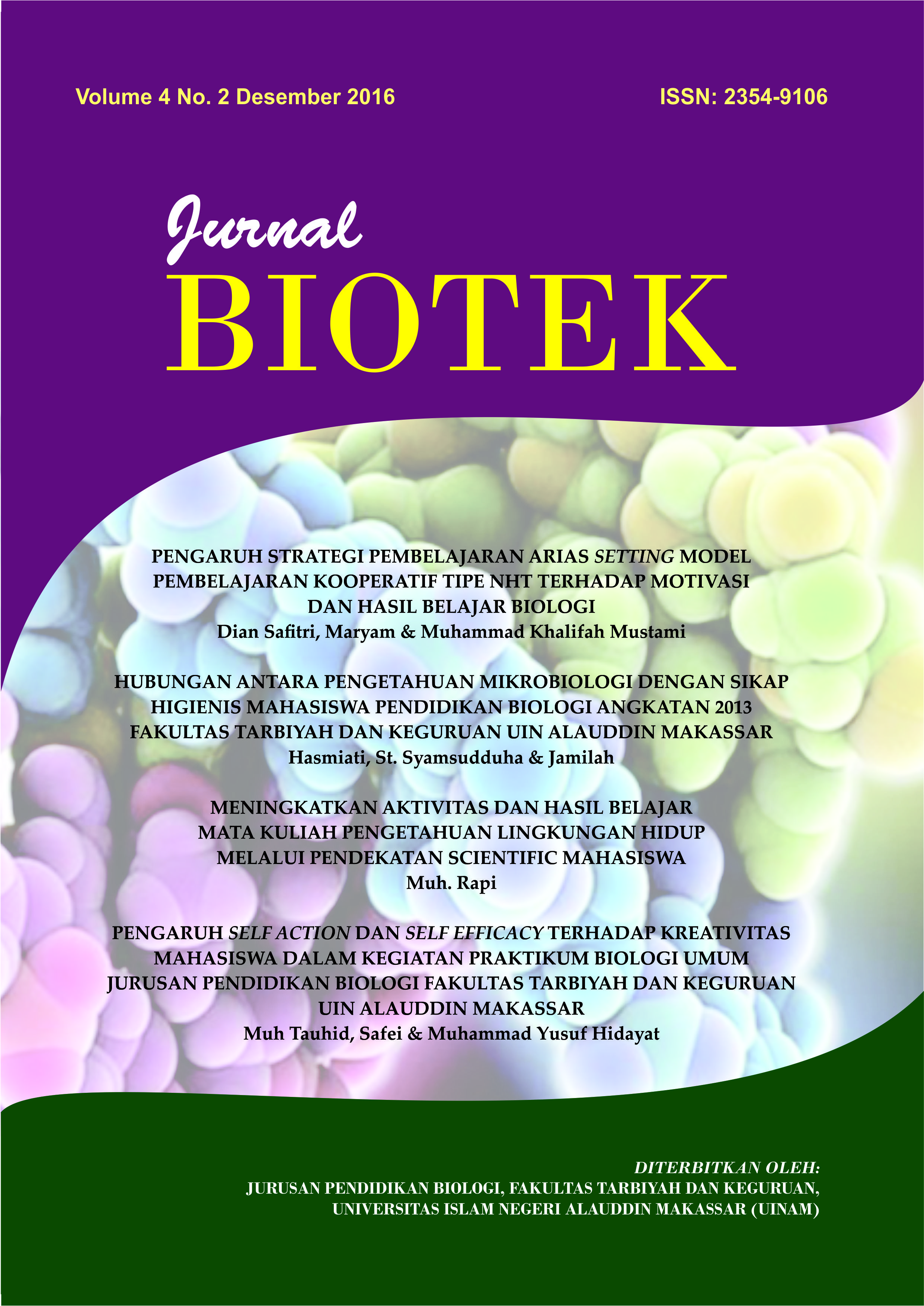PERBANDINGAN PENERAPAN MODEL PEMBELAJARAN PEER MEDIATED INSTRUCTION AND INTERVENTION DAN MODEL PEMBELAJARAN THINK PAIR-SHARE TERHADAP HASIL BELAJAR BIOLOGI
Abstrak
This research is motivated by the problems derived from the observation that low motivation and activeness and student learning outcomes in learning biology, evident from the study of biology class VII SMP Negeri 2 Bajeng West, in general, students received grades that are still under the KKM. In this study, researchers used peer learning model Mediated Instruction and Intervention (PMII) type Peer Mediated Instruction And Intervention (CWPT) and learning model Think Pair-Share (TPS) to foster motivation and activeness of student learning.
This study aims to (1) To determine the result of studying biology class VII SMP Negeri 2 Bajeng Gowa on the subject of diversity of living creatures that learned learning model Peer Mediated intruction and Invention (PMII) type Class Wide Peer Tutoring (CWPT) (2) to find out the results of studying biology class VII SMP Negeri 2 Bajeng Gowa on the subject of diversity of living creatures that learned and learning model Think Pair-Share (TPS) (3) to determine differences in learning outcomes biology class VII SMP Negeri 2 Bajeng Gowa on the subject of diversity of living creatures that learned to Peer Mediated learning model intruction and Intervention (PMII) type Class Wide Peer Tutoring (CWPT) and learning model Think Pair-Share (TPS).
This study is a quasi-experimental research (quasi) using a pretest-posttest design nonequivalent control group design. The population of this study were all students of class VII SMP Negeri 2 Bajeng Gowa district in 2015/2016 academic year consisting of five study groups totaling 151 students, with a sample of 25 people in the class VIIB and 25 people in the class VIIA.
The results showed that the obtained tcount 1,680 <ttable 2,000 and significance (0.000 <0.05), suggesting that H0 and H1 accepted, so it can be concluded that there is positive and significant difference in the application of learning models Peer Mediated Instruction and Intervention (PMII) type class Wide Peer Tutoring (CWPT) to class VIIB using learning model Think Pair-Share (TPS) for class VIIA.
##plugins.generic.usageStats.downloads##
Referensi
Arwin. (2014). Pengaruh Strategi Pembelajaran Assurance, Relevance, Interest, Assesment, Satisfaction (ARIAS) Terintegrasi Model Pembelajaran Kooperatif Tipe Think-Pair-Share (TPS) Terhadap Minat dan Hasil Belajar Biologi Siswa Kelas XI IPA SMA Negeri 1 Tanete Riaja.Tesis (tidak diterbitkan). Pascasarjana UNM Makassar.
Budiati. (2012). Penerapan Model Pembelajaran Peer Mediated Instruction And Intervention (Pmid Tipe- Classwide Peer Gwpd Danteknikevaluasi Index Card Match Untuk Meningkatkan Kualitas Proses Dan Hasil Pembelajaran Biologi Kelas VII SMP Negeri 22 Surakarta. Jurnal Online. (Http/www;unesha.co.id, Akses 19/09/2015).
Djumingin. (2011). Strategi dan Aplikasi Model Pembelajaran Inovatif Bahasa dan Sastra. Makassar: Badan Penerbit UNM.
Hamsiah. (2012). Peer Mediated Instruction and Intervention (PMII) tipe Classwide Peer Tutoring (CWPT) dan Kemampuan Akademik pada Pembelajaran IPA Biologi SMK Online. (http//:IPABiologiSMK.ac.id.)
Hidayah Noor, dkk. (2012). Penerapan Model Pembelajaran Class-Wide Peer Tutoring (Cwpt) Disertai Media Cergam untuk Meningkatkan Kualitas Pembelajaran Biologi Siswa Kelas X 7 SMA Negeri 2 Sukoharjo, h. 99. Online. (http//;Biologi.kelasX7SMANegeri.Sukoharjo.ac.id.)
Huda. (2012). Cooperative Learning (Metode, Teknik, Struktur dan Model Penerapan) Yogyakarta: Pustaka Pelajar.
Mahendrayani, dkk. (2014). Pengaruh model PMII tipe CWPT Berbantuan Mnemonic Terhadap Hasil Belajar IPA Siswa Kelas V SD. Jurnal Online. (Http//www: PGSD Ganesha.ac.id., Akses 19/09/2015).
Nobel, Michele McMahon. (2011). Effect of Classwide Peer Tutoring in The Acquisition, Maintenance, and Generalization of Science Vocabulary Words for Seventh Grade Students with Learning Disabilities and/or Low Achivement, h. 16. Online. (http//: Boston The Ohio University)
Nugraheni. (2009). Strategi Pembelajaran ARIAS. Bandung: Remaja Rosdakarya.
Sanjaya. (2006). Strategi Pembelajaran Berorientasi Standar Proses Pendidikan Jakarta: Kencana Prenada Media Grup.
Slameto. (2003). Belajar dan Faktor-faktor yang Mempengaruhinya. Jakarta: Rineka Cipta.
Sugiyono. (2010). Metode penelitian pendidikan: pendekatan kuantitatif, kualitatif, dan R&D..Bandung: Alfabeta.
Terry, Barbara. (2011). An Introduction to Class Wide Peer Tutoring, h. 78. Online. (http://www. specialconnections.ku.edu/cgi-bin/cgiwrap/specconn/main.)
Yatim. (2010). Paradigma Baru Pembelajaran. Jakarta: Prenada Media Group.
Authors who publish with Jurnal Biotek agree to the following terms: Authors retain the copyright and grant Universitas Islam Negeri Alauddin Makassar right of first publication with the work simultaneously licensed under a Creative Commons Attribution License (CC BY-SA 4.0) that allows others to share (copy and redistribute the material in any medium or format) and adapt (remix, transform, and build upon the material) the work for any purpose, even commercially with an acknowledgement of the work's authorship and initial publication in Universitas Islam Negeri Alauddin Makassar. Authors are able to enter into separate, additional contractual arrangements for the non-exclusive distribution of the journal's published version of the work (e.g., post it to an institutional repository or publish it in a book), with an acknowledgement of its initial publication in Universitas Islam Negeri Alauddin Makassar. Authors are permitted and encouraged to post their work online (e.g., in institutional repositories or on their website) prior to and during the submission process, as it can lead to productive exchanges, as well as earlier and greater citation of published work (See The Effect of Open Access).

This work is licensed under a Creative Commons Attribution-ShareAlike 4.0 International License.



